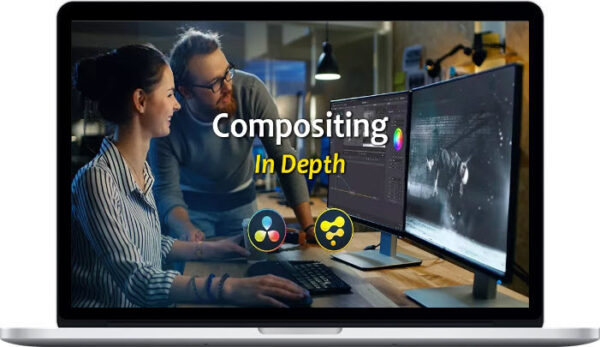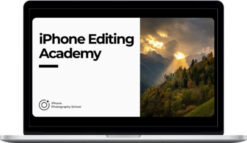VFXstudy – Bernd Klimm – Compositing with DaVinci Resolve & Fusion
$79.00 Original price was: $79.00.$27.00Current price is: $27.00.
Delivery: Within 24 hours
VFXstudy – Bernd Klimm – Compositing with DaVinci Resolve & Fusion
Use Fusion inside DaVinci Resolve or Fusion Studio to add VFX, create set extensions, composite green screen, fix every day production problems and more.
Compositing is about extracting and combining images from different sources into a new coherent photo-realistic result. At the heart of it is Rotoscoping, Keying, Tracking, Integration and more. This course builds strong foundations and takes each of those topics to a level that few other courses reach.
More than Tools!
- It’s not about loading and saving – Set up a linear workflow, understand the domain of definition, color bit depth, gamma, gamut, and more.
- It’s not about using the Polygon mask – Extract an actor by covering the human anatomy with multiple roto-shapes and animate them for consistent edge detail.
- It’s not about the Delta Keyer – Build advanced keying workflows with multiple preprocessing techniques, screen correction, adaptive despill, custom luma keyers, and more.
- It’s not just about tools – learn compositing in depth!
What You’ll Learn In Compositing with DaVinci Resolve & Fusion?
- System and Workspace
Understand high level hardware considerations for Fusion as well as general settings and concepts that are used throughout this course. - Image Fundamentals
Back to the Basics! Learn about the anatomy of an image and everything about how Fusion handles the frame size, domain of definition, color depth, color space, alpha pre and post multiplication, as well as recommended image file formats for compositing. - Rotoscoping & Paint
Description for this block. Use this space for describing your block. Any text will do. Description for this block. You can use this space for describing your block. Description for this block. Use this space for describing your block. Any text will do. Description for this block. You can use this space for describing your block. - Keying: Overview and Warm Up Exercises
Learn about the variety of different keying issues, set up a linear workflow, and get started with building your own tools with custom curves, color space transformations and more. Here you also review Fusion’s keying tools and see what functionality they have in common and learn to create advanced workflows to combine multiple keying and despill operations. - Advanced Keying Step by Step
Here comes the nitty-gritty detail. Learn about the impact of chroma subsampling as well as noise and grain. Use advanced techniques to create a clean plate and perform a screen correction for an uneven greenscreen before the keying process. Learn different despill techniques including an adaptive despill for better edges. Finally, you see advanced ways to handle edges and to add blonde hair detail with a custom luma keyer. A deep dive into the advanced settings of the delta keyer concludes the chapter. - Compositing and Integration
No matter if your footage is coming from Roto, Keying or 3D. You need to match color, create convincing shadows, deal with edge effects, interactive lighting, depth of field, lens distortion and more. - Tracking
Learn advanced tracking workflows with point tracker, planar tracker and the 3D camera tracker. Understand the underlying principles of 3D tracking and scene creation and learn to fix camera tracks that failed. - 3D and Multipass Compositing
Create 3D Projections, use multipass exr files, explore the most common render passes as well as the technical render passes available in Fusion. Understand workflows with third party integrations and understand the strengths and limitations of Fusion in the 3D pipeline. - Case Studies
Here, everything comes together in realistic case studies. In each example you will start from scratch and create a polished shot. - Interview: A mid-budget greenscreen scenario of an interview with a variety of keying and integration problems.
- 3D Set Extension: Example for a set extension with 2D and 3D techniques combined.
- Blender Tears of Steel Scene: A high-end greenscreen shot with 3D camera movement that we combine with render passes from a virtual 3D environment.
Who Is Compositing with DaVinci Resolve & Fusion For?
This course is ideal if you…
- have taken another VFXStudy course for Fusion before
- have worked through multiple tutorials or your own projects and feel comfortable with the software in general.Line 2
You should…
- be familiar with node-based compositing
- understand the Fusion viewers and general interface
- be able to load/save, import/export, and render
- feel comfortable with masks and keyframe animations
- know the most important tools. For example, you know most tools you see in the Fusion onscreen toolbar.
More courses from the same author: VFXstudy
Be the first to review “VFXstudy – Bernd Klimm – Compositing with DaVinci Resolve & Fusion” Cancel reply
You must be logged in to post a review.
Related products
Design & Creative
Design & Creative
Design & Creative
Design & Creative
Design & Creative
Design & Creative
Emil Pakarklis – iPhone Editing Academy – iPhone Photo Masters
Design & Creative
Design & Creative













Reviews
There are no reviews yet.